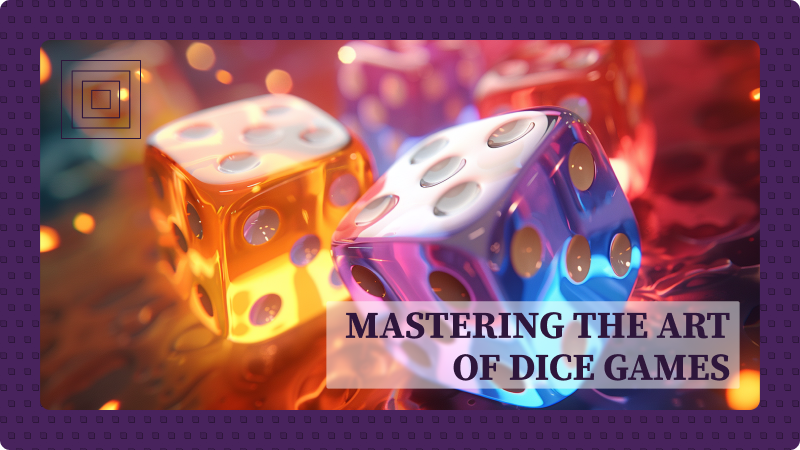In the vibrant world of gaming, dice games stand out as a timeless classic, offering endless entertainment and excitement to players across the globe. Whether it’s the allure of rolling dice in anticipation of landing that perfect score, the strategic depth found in betting games, or the sheer variety of games available, there’s something inherently captivating about this genre. From the casual gatherings around a table to the electrifying atmosphere of casino floors, dice games have carved a niche that resonates with both seasoned gamers and newcomers alike.
The essence of dice games lies in their simplicity and the unpredictability of each roll, making every game a fresh adventure. Games like Craps, Yahtzee, and Bunco have transcended cultures and generations, each offering a unique blend of strategy, luck, and social interaction. This article aims to guide you through the exhilarating world of dice games, shedding light on how to play, strategies to win, and why these games have become a staple in both home and casino gaming collections.
Unlock the Thrill: Mastering the Art of Dice Games

At its core, a dice game involves players taking turns to roll a set of dice, with the outcome determining the progress or result of the game. The simplicity of this premise belies the depth and variety found within different games. To embark on how to play a dice game, one must first acquaint themselves with the common types of dice. The most familiar are the six-sided dice, but variations can include dice with anywhere from four to twenty sides, each adding its unique twist to gameplay.
Understanding game objectives is crucial. In a basic rolling dice game, the goal might be to achieve the highest or lowest score, or perhaps to hit a specific number. In contrast, a dice betting game introduces an element of wagering, where predicting outcomes becomes a pathway to victory. Meanwhile, a dice casino game elevates the stakes, blending luck with a tactical approach to betting.
The beauty of dice games lies in their diversity. A dice game can range from the straightforward fun of ‘Pig’—where rolling a one might end your turn but scoring big is a temptation hard to resist—to the complexity of ‘Craps’, a staple in the dice casino game scene.
Craps involves players betting on the outcome of the roll of two dice, with a variety of bets available, each with its own rules and odds.
For those wondering how to play a dice game that involves strategy, ‘Yahtzee’ presents a compelling challenge. Players aim to fill out a scorecard with specific dice combinations, with each round offering a strategic decision: which combination to pursue and which dice to re-roll.
Learning how to play dice game variants effectively requires understanding the balance between risk and reward. In a dice betting game, for instance, knowing when to push your luck and when to hold back is key. The thrill of potentially rolling the perfect combination has to be weighed against the risk of losing everything on a single bad roll.
For beginners eager to dive into how to play a dice game, starting with simpler games like ‘Farkle’—where the goal is to score points by rolling combinations of dice—can be a great introduction. As players become more comfortable, they can advance to more complex games, exploring different strategies and betting techniques.
Dice Games: A Comprehensive Analysis Compared to Other Popular Games

Dice games, by their very nature, revolve around the simple act of rolling dice. This mechanic is central to a vast array of games, from the casual backyard entertainment of rolling dice games to the intense strategic play found in dice betting games. The beauty of dice lies in their randomness, providing an equal ground for all players, regardless of experience. This unpredictability is a stark contrast to card games, where strategy and skill often overshadow the element of chance. In card games, players can calculate odds and influence outcomes through bluffing and strategy, while dice games rely more heavily on the luck of the roll, with strategy playing a role in how players respond to those outcomes.
How to play a dice game varies significantly across different types, from simple games where the highest roll wins to more complex games involving betting, strategy, and even board game elements. For example, in a dice casino game, players might bet on the outcome of a roll or series of rolls, introducing a risk-reward element that requires careful consideration. On the other hand, the best dice game might combine elements of chance and strategy, allowing players to influence the game’s outcome through strategic decisions while still leaving room for the excitement of a lucky roll.
Comparing dice games to board games highlights another layer of distinction. While many board games incorporate dice as a mechanism to determine movement or outcomes, dice games often use the dice themselves as the main focus. Board games typically involve a set board or path that players navigate, with dice rolls influencing movement. However, in pure dice games, the gameplay might center entirely around the outcome of the dice, with players competing to achieve specific combinations or scores. This focus on dice as the primary element makes dice games more portable and versatile, requiring fewer components and less setup time than traditional board games.
Digital games, on the other hand, offer a different kind of competition to traditional dice games. While digital games can simulate the experience of rolling dice, they often lack the tactile satisfaction of physically throwing dice and seeing the unpredictable outcome unfold in real-time. However, digital dice games can incorporate complex algorithms to introduce a broader range of outcomes and scenarios, making them a worthy counterpart to physical dice games. Despite this, the simplicity and physicality of rolling dice in a traditional game dice setting often hold a special appeal that digital games struggle to replicate.
The allure of figuring out how to play dice game lies not just in the roll of the dice but in the social interaction it encourages. Dice games are inherently social, often designed for multiple players and encouraging interaction, whether through competitive play in a dice betting game or cooperative strategies in team-based dice games. This social aspect is something that many video games and some board games attempt to replicate but can fall short without the direct, face-to-face engagement that dice games foster.
The Legal Landscape of Dice Games in Tanzania: A Comprehensive Overview

At the core of Tanzania’s approach to gaming regulation is a commitment to ensuring a safe, fair, and responsible gaming environment. This ethos is embodied in the establishment of regulatory bodies and the enactment of laws designed to oversee and guide the operation of gaming activities, including dice games. The Gaming Board of Tanzania, as the principal regulatory authority, plays a pivotal role in this ecosystem, overseeing the licensing, monitoring, and enforcement of gaming activities to safeguard the interests of players and stakeholders alike.
Dice games, with their diverse forms ranging from traditional rolling dice games to more sophisticated dice betting and casino dice games, occupy a unique niche within Tanzania’s gaming landscape. These games, often celebrated for their simplicity and accessibility, require players to roll dice to achieve specific outcomes, with rules varying widely depending on the game variant. The popularity of dice games, including well-known formats like “a dice game” or “the best dice game,” underscores their appeal as a source of entertainment and, for some, a means of livelihood.
Navigating the legal nuances of dice gaming in Tanzania entails understanding the regulatory distinctions between casual play and commercial gaming operations. Casual dice games, typically played among friends and family, generally fall outside the stringent regulatory oversight, provided they do not involve gambling elements. Conversely, commercial operations offering dice games, especially those characterized as dice betting games or casino dice games, require adherence to a comprehensive set of regulations. These include obtaining a license, ensuring game fairness, and implementing measures to prevent gambling-related harm.
The Tanzanian government’s stance on dice games and gambling, more broadly, is informed by a desire to balance cultural practices with the economic benefits of gaming tourism and industry growth. However, this balance is delicately maintained to prevent the negative impacts associated with gambling, such as addiction and financial instability. Hence, the regulatory framework is designed to be both enabling and protective, fostering a gaming environment that contributes positively to the economy while mitigating potential downsides.
One of the critical aspects of Tanzania’s regulatory approach is the emphasis on responsible gaming. Operators offering dice games are mandated to implement programs and measures that promote responsible gaming behaviors among players. This includes providing information on how to play dice games responsibly, offering self-exclusion options, and supporting initiatives aimed at preventing and addressing problem gambling. Such measures are indicative of Tanzania’s holistic view of gaming regulation, where the welfare of the individual player is held in high regard.
Dice Game FAQs: Your Ultimate Guide



